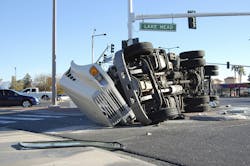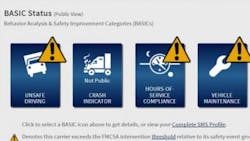FMCSA study: Crash accountability analysis expensive, would not improve CSA
The report, made public Wednesday, comes in response to trucking industry criticism that the Compliance, Safety, Accountability (CSA) system for evaluating carrier safety does not distinguish between accidents in which the truck or truck driver is to blame and accidents in which the truck clearly was not at fault. Accidents figure into CSA’s Crash Indicator BASIC, a calculation which ranks carriers based on their propensity for accidents.
FMCSA currently considers all recordable crashes involving a commercial vehicle occurring in the preceding 24 months. Independent research has demonstrated that a motor carrier’s involvement in a crash, regardless of their role in the crash, is a strong indicator of their future crash risk, the agency contends.
And while incorporating fault determination could improve future crash prediction by as much as 5% for carriers involved in fatal accidents, such accidents represented only 3% of all crashes in the agency’s database.
“Analysis using all crashes shows that incorporating crash weighting determinations does not consistently improve the Crash Indicator when the various weighting approaches are applied,” the study concludes.
Additionally, the timeframe for the entire process—including the submission of the PAR by law enforcement, its receipt by FMCSA, analysis to make a crash weighting determination, possible appeal of the analysis results, and final disposition of the appeal—could exceed the 2-year analysis period used by the SMS.
The study also estimates that the annual costs for operating a system to process PARs would be between $3.9 million and $11.2 million.
Trucking reacts
Trucking interests expressed “disappointment” in the study’s conclusions and in the agency’s reluctance to correct a process considered to be unfair.
“It is not lost on the trucking industry that the word ‘Accountability’ is in the title of CSA, yet FMCSA continues to ignore crash accountability,” said American Trucking Assns. Executive Vice President Dave Osiecki.
ATA has called for improvements to CSA, particularly where, in the association’s view, the agency contends that just being involved in a crash is an indicator a carrier may not be safe.
“Numerous times over the past five years, ATA has respectfully requested FMCSA to screen out crashes from CSA where it is plainly evident the professional truck driver and motor carrier were not at fault,” said Osiecki. “Instances where a truck is rear ended by a drunk driver, or hit head on by a motorist traveling in the wrong direction on the interstate, or as happened just Monday when a truck was struck by a collapsing bridge are clearly not the fault of the professional driver and certainly should not be used to target his or her carrier for potentially intrusive government oversight.”
The Owner-Operator Independent Drivers Assn. called on FMCSA to thoroughly apply the data available to it.
“If the agency is providing information to the public that is to be used to make safety decisions or conclusions, that information should be relevant, accurate and as complete as humanly possible,” said OOIDA spokeswoman Norita Taylor.
Now that the study of crash accountability is complete, FMCSA will invite public comment on the report along with a request for feedback on what steps the agency should take regarding the weighting of crash data in the agency’s systems based on the carrier’s role in a crash.
That notice will be published in the Federal Register on Friday.
ATA Chairman Duane Long is holding out for a reasonable resolution of the issue.
“We want to be fairly judged and not be penalized by crashes our professional drivers could not reasonably avoid,” said Long, chairman of Longistics, Raleigh, N.C. “It’s not only a fairness issue; it’s a good government oversight approach. We continue to trust FMCSA might eventually arrive at this conclusion.”
About the Author
Kevin Jones 1
Editor
Kevin has served as editor-in-chief of Trailer/Body Builders magazine since 2017—just the third editor in the magazine’s 60 years. He is also editorial director for Endeavor Business Media’s Commercial Vehicle group, which includes FleetOwner, Bulk Transporter, Refrigerated Transporter, American Trucker, and Fleet Maintenance magazines and websites.

